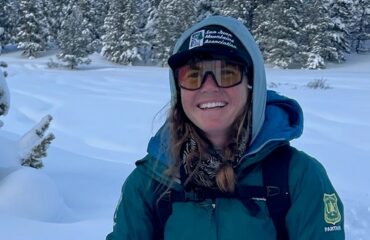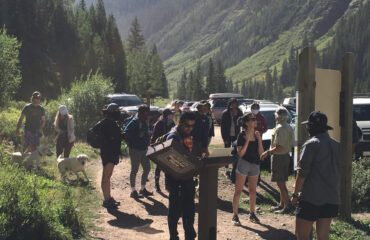
By Jake Anderson, SJMA Wilderness Crew Member
Dawn breaks. Squinting and rolling awake, I rise quickly. A coyote yowls, calling out to its pack, sounding like a rooster to my ears. The backcountry morning bites at me as I crawl out of my bag and begin to ready myself for the day ahead. Popping my head out from my tent, I’m greeted with a glowing view of the surrounding forest. The sun casts a radiant blanket over the trees, memorializing a kingdom of dead giants and nurturing the inconspicuous saplings aspiring to replace them. It pours out into the meadow from which I gaze, gradually dispelling the shadow. It reaches and warms me as I muse.
I’ve had this sort of pleasant subalpine morning many times; its vibrancy is familiar to many, no doubt. But this morning, my achy back reminds me, I’m not at leisure – there’s a job to do. It was a push just to get to this campsite, and there are untold trees down on the trail ahead. If anyone is going to enjoy moving freely up and down this trail, it’ll be in the wake of my crew. Feeling purposeful, I grab my saw.
Our crew of four SJMA Wilderness Stewards and two USFS Forest Protection Officers is dedicated to the task of opening trails in the Rio Grande NF, working our butts off in the face of some daunting challenges. To date this year, we have covered 212 miles, done 340 ft of tread work, brushed 4,912 feet of trail, removed a whopping 2,086 trees, and met 194 people along the way.
The logs we move, using only hand saws and levers, axes, wedges, and good communication, are sometimes astounding. The difference we make is really tangible; it’s very affirming. I’ve also witnessed firsthand the enormity of what we are undertaking, trying to keep trails open amid the dead and dying trees and the inevitability of gravity. Despite the impressive numbers, there’s a lot left to be done. More than once this summer we have had to leave sections of trail uncleared, simply because we lack the labor force to finish the job. And there’s always another project waiting in the wings – the trees keep falling. Beetle kill, wildfire, windstorms and washouts have all amounted to more complex situations on trail and at camp in the backcountry.
Besides just having to climb over and around more trees, visitors to our wild places these days have to be more aware of dangers like fire and falling trees, an unfortunate fact of our evolving world.
Being the boots on the ground, cutting trail, I see a lot of kerf and only an occasional passerby (usually elk, sometimes human). I have plenty of time to think about the metaphor in my work, about how unignorable a tree in the way is, then how easily the fresh cuts that mark its removal go unnoticed. The logs pile high, trailside.
Ed Abbey once said, “The idea of wilderness needs no defense, Only more defenders.” You can help! You don’t need a crosscut saw to make an impact. Become an SJMA member, donate, or volunteer by visiting: https://sjma.org/get-involved/



